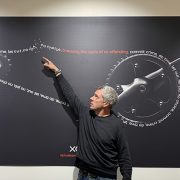Lewisham is the unlikely homeland of time banking, a revolutionary idea based on mutual self-help.
Rushey Green Time Bank, founded in 1998, was one of the first time banks to be set up in the country and has become a benchmark for others across the UK.
‘Time banks are based on equality and the principle of co-production, where service users also provide skills to the group, rather than being passive recipients. Time, not money, is the currency exchanged between individuals. One hour of your time earns you one time credit.
The hour of time that is donated can range from talking to someone who needs a chat, teaching a French class, writing a letter for someone or doing some DIY. The time credit earned can then be spent when that person needs help.
By creating a system in which people share their skills, a community is built, linking people together in a social, not economic sphere. The bold idea was devised by civil rights lawyer and activist, Dr Edgar Cahn, when he was at the LSE in the 1980s.
Rushey Green Time Bank was set up in 1998 and was based at the Rushey Green Group Practice, a GP surgery in Catford. Since then it has grown at a phenomenal rate and now has around 235 members, with around 100 members who participate on a regular basis.
Charmaine Jacobs joined the time bank in 2006. She is now the broker, a job which involves keeping accounts and matching people who want help with people who can help them.
She said: “After I had my son in 2006 I felt quite isolated and trapped as a new mum, and I wanted to meet people who were in a similar position. I also had lots of skills but felt like I wasn’t using them. My health visitor gave me a leaflet about the parent and baby group run by the time bank.”
Jacobs added: “After I became a member I was able to use my admin skills to help the parent and baby groups, and the whole experience helped me value my skills. My job now is to facilitate relationships and events. At the moment we’re working on a community garden project. ”
According to Time Banking UK there are currently 92 active time banks and 108 developing time banks in the country.
Not all of them have been successful and the area has seen a number of projects come and go over the years. Jacobs attributes the sustained success of Rushey Green Time Bank to its strong sense of community and links to the GP surgery.
The time bank also receives referrals from the GP practice, as patients with anxiety and minor mental health problems are better treated by interacting with other people rather than taking medication.
Jacobs said, “People with mental health needs feel valued when they are part of a time bank, they lose their ‘mentally ill’ labels when they are members.”
At Rushey Green many of the members are of Afro-Caribbean origin. A majority of its members are over 60, and Jacobs is keen to recruit more young people.
“The whole idea of the time bank revolves around co-production, but sometimes with elderly people, they have a list of ailments, and want to be served, rather than help produce,” she said.
The founder of the Lee Fair Share time bank, retired psychologist Andrea Hughes has been living in Lee for the past 30 years. She was attracted to the economics of the system, with its emphasis on time as a community currency. With the help of the New Economics Foundation, an independent think tank, she started the time bank in 2005, going to libraries and health centres to find potential members.
The Lee Fair Share time bank operates on a much smaller scale than the Rushey Green Time Bank, with around 70 members. Its broker, Maria Pont, explains the benefits of having a small time bank.
“It was very important to Andrea that the time bank was small enough so that we could walk to each others’ houses. In this way, it becomes a neighbourhood and a true community. If it’s bigger, then the time bank is just a skills exchange.”
Down the road, in the leafier suburbs of Blackheath, one of Lee Fair Share’s members is setting up another time bank.
Gill Stoker, an Open University tutor in her mid-50s, said: “People are so isolated and wary of getting to know other people these days. They’re not very trusting. Time banks are a great way of building up trust in local communities and creating cohesion.”
She added: “The beauty of time credits is that everybody gains something. No-one feels like an object of charity. I get back what I give out.”
The ethos of time banking, with its focus on empowering local people and communities, resonates with David Cameron’s mantra of the moment on the ‘Big Society’. He wants to build a society that will: “Take power away from the politician and give it to the people.” So are we going to see time banks popping up across London?
Not according to Gill Stoker. “Time banks invented the big society. David Cameron latched onto the idea a bit late in the day.”
Andrea Hughes has no desire to be part of the coalition government’s plans to shake up British society.
“I have a very socialist outlook so I don’t want the Lee Fair Share to be subverted by the government’s agenda. We’re not going to fill the gaps that government cuts are causing and we are not in the business of propping up council services.”
Time banks in the area are unclear as to how their function will change or evolve in the future, and none have received any extra funding to put into place the government’s vision of volunteer run, self- sufficient communities.
Charmaine Jacobs said, “I’ve been to a few meetings about the government’s plans but it’s all very unclear what they plan to do.”
“All I can say is that time banks are the big society. We are the ‘Big Society.”







“Are time banks the future for the ‘Big Society’?”
Jct: The UNILETS Millennium Declaration C6 to restructure the global financial architecture with a time-based currency seems to say yes. Of course, it’s not as if anyone knows about the UNILETS declaration but it’s there and someday, the online timebank will be the world currency.
Jct: In 1999, under the UNILETS Time Standard of Money, I paid for 39/40 nights in Europe with a timebank IOU for a night back in Canada worth 5 Hours which I recorded on my public do-it-yourself timebank account and paid no interest: http://johnturmel.com/unilets.htm With Africa trading with mobile-phone minutes, Arabia trading with mobile-phone card credits, with Hours being traded in Ithaca, with Greencredits being traded in LETS, With Facebook’s Acebucks, Twitter, Google, Craigslist, offering social currencies to their databases, each transaction with alternative currency means the banks got no interest. The movement to cut the middlemen out of their usury is growing. It’s a new game with new chips and the banks are going bust. So it would seem that the low-tech Gold Standard of Money people wanting to base their chips on yellow and silver rock is really bringing up the rear while the rest of high-tech world has already moved on to the universal online Time Standard of Money.